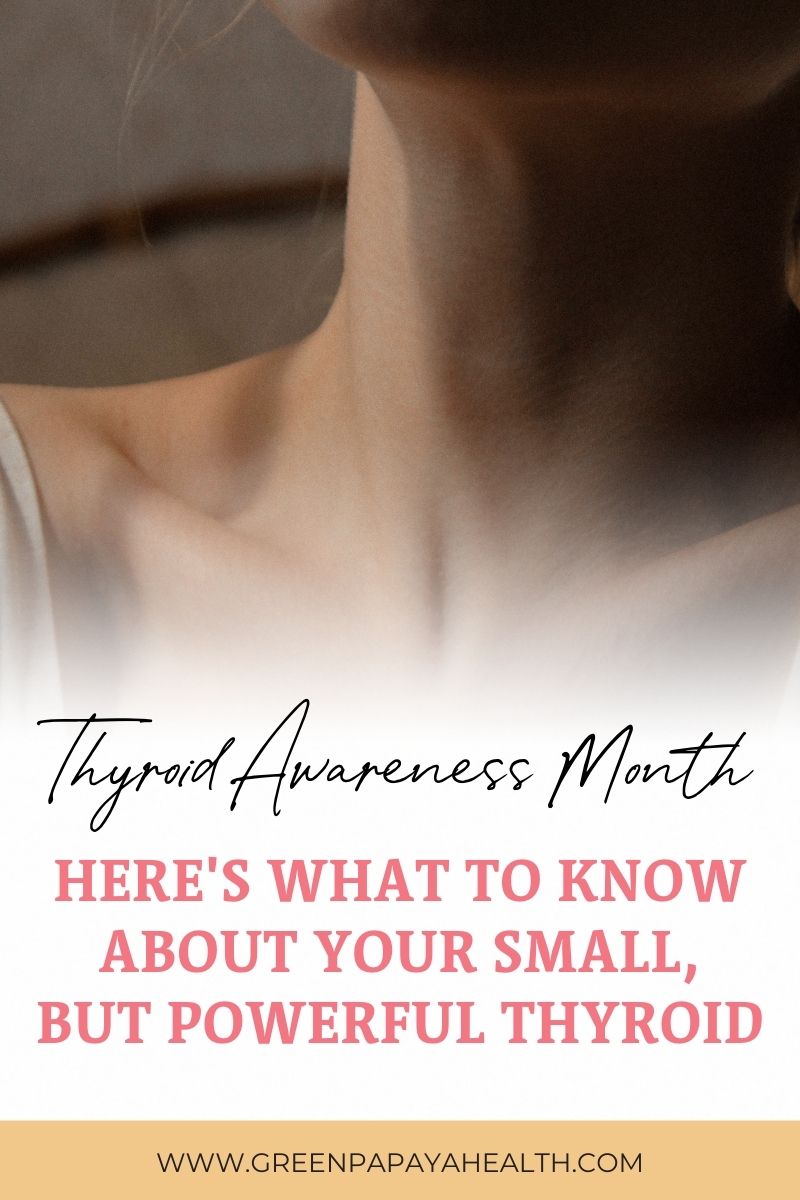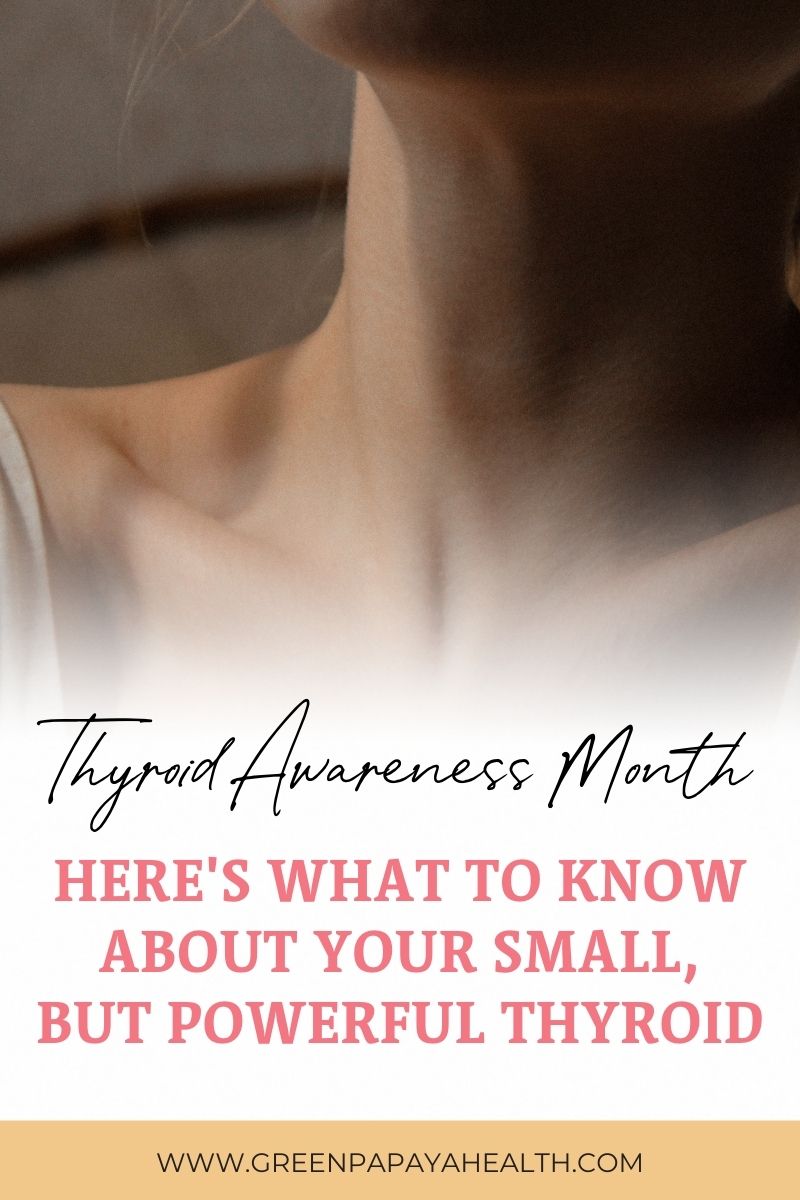The glandula thyreoidea, more commonly known as the thyroid gland, is a tiny butterfly-shaped organ that sits just below the Adam’s apple in the front of the neck. It produces three types of hormones, including triiodothyronine (more commonly known as T3), tetraiodothyronine (abbreviated as T4 or thyroxine), and calcitonin (a hormone produced by the C cells in the thyroid). Sometimes our thyroids produce too much of these important hormones, and other times they don’t produce enough.
Weighing between 20 and 60 grams and measuring just two inches in length, the thyroid gland is small but ever so powerful. It regulates everything from our metabolism to our body temperature, and an underactive or overactive thyroid can cause a whole slew of symptoms that interfere with practically every facet of our lives.
For instance, the symptoms of an underactive thyroid (known as hypothyroidism) can impair our body image, sex drive, and self-esteem. On the other hand, symptoms associated with an overactive thyroid gland (known as hyperthyroidism) can affect our vision, sleep quality, heartbeat, and skin.
If left untreated — like so many thyroid conditions are — the thyroid gland could swell and a goiter may develop. We could also experience other complications like fertility issues, mental health concerns, and heart disease.
While the thyroid may be small, this butterfly-shaped gland is responsible for so much — and that’s why the month of January is dedicated to spreading thyroid awareness. Here are a few things you should know about the thyroid, including what to do if you suspect you’re dealing with a disorder of the thyroid gland — or an autoimmune condition such as Hashimoto’s thyroiditis or Graves’ disease.
Common Symptoms of Thyroid Dysfunction in the Body
An overactive or underactive thyroid gland can cause a multitude of symptoms throughout the body, ranging from weight fluctuation and fatigue to hair loss and changes in body temperature regulation. Symptoms typically vary depending on whether your thyroid gland is producing too much or too little thyroid hormone, but there is some overlap between hyperthyroidism and hypothyroidism. Goiters, for instance, can occur in hyperthyroidism as well as hypothyroidism.
Symptoms of an Underactive Thyroid Gland (Hypothyroidism)
When your body fails to produce enough of the T3 and T4 hormones, you may experience symptoms of hypothyroidism. Symptoms of hypothyroidism often include:
- Depression, fatigue, and brain fog.
- Thinning hair and eyebrows.
- Dry skin and hair.
- Brittle nails.
- Cold intolerance.
- Weight gain.
- Weak muscles and stiff joints.
- Facial swelling.
Hashimoto’s Disease
For the majority of those with an underactive thyroid gland, autoimmune thyroiditis is to blame. More commonly known as Hashimoto’s disease, autoimmune thyroiditis occurs when the immune system attacks the thyroid gland — damaging the organ and causing many of the symptoms described above. Some individuals with autoimmune thyroiditis will also develop an enlarged thyroid gland, known as a goiter.
Hashimoto’s disease is much more common in women than in men, particularly women between the ages of 30 and 50. Those who have been diagnosed with other autoimmune conditions or have a family history of thyroid disease have an increased risk of developing autoimmune thyroiditis.
Symptoms of an Overactive Thyroid Gland (Hyperthyroidism)
When your thyroid produces too much of the T4 hormone, you may experience hyperthyroidism symptoms. These symptoms often include:
- Unexplained weight loss.
- A racing, irregular, or pounding heartbeat.
- Menstrual issues, such as infrequent or absent periods.
- Irritability, anxiety, and nervousness.
- Concentration issues.
- Heat sensitivity and excessive sweating.
- Thinning skin and hair.
- Frequent bowel movements.
- Sleep disturbances.
Graves’ Disease
If you’re experiencing symptoms of hyperthyroidism, Graves’ disease could be the cause of your overactive thyroid. Graves’ disease is a disorder of the immune system and the most common cause of hyperthyroidism, typically affecting adult women between 30 and 50 years of age.
While men can also develop Graves’ disease, women have a much greater risk of developing this autoimmune disorder. This is especially true for those who have:
- Been diagnosed with another disease of the immune system, such as lupus, celiac, Type 1 diabetes, or rheumatoid arthritis.
- A family history of thyroid disease.
- Been diagnosed with disorders such as pernicious anemia, vitiligo, or Addison’s disease.
For those with Graves’ disease, several ophthalmological symptoms may also occur. These symptoms could include bulging and swollen eyes, retracted eyelids, and double vision. Rarely, localized skin lesions known as pretibial myxedema occur in those with Graves’ disease as well as Hashimoto’s thyroiditis.
Other Causes of Autoimmune Thyroid Disease
While genetic predisposition may increase your risk of developing an autoimmune thyroid disease, other common triggers include physical and emotional stress, poor dietary choices, and lifestyle factors. A leaky gut (also known as enhanced intestinal permeability), intolerances to gluten and dairy, and ongoing exposure to environmental toxins like fluoride, chlorine, and bromine can all lead to the development of autoimmunity.
Even some seemingly “healthy” foods may act as thyroid function disruptors. These include large quantities of raw cruciferous vegetables (e.g. broccoli, kale, and cauliflower), refined vegetable oils, and unfermented soy products like tofu and soy milk. When consuming soy, fermented products are best.
Where to Go From Here
If you suspect you’re dealing with an overactive or underactive thyroid gland, your first step is to run a full thyroid blood panel. This will measure your thyroid stimulating hormone (TSH), Free T4, Free T3, and Reverse T3. It’s also important to order the following tests to look for thyroid antibodies in the blood, as these are used to diagnose an autoimmune thyroid disease such as Hashimoto’s or Graves’:
- Thyroid peroxidase antibodies (TPO)
- Thyroglobulin antibodies (Tg)
Some individuals with autoimmune thyroid disease will have high levels of TPO and Tg antibodies in the blood, while others will test high for one but not the other. Additionally, a thyroid ultrasound may be ordered to diagnose autoimmune thyroid disease and identify thyroid nodules.
It can take some time to obtain a diagnosis of thyroid disease, but it’s important to listen to your symptoms and look for a medical practitioner who will fight for you and the good health you deserve. And fortunately, you don’t have to go at it alone. Let me be your guide as you navigate the next steps in your thyroid journey. I’ve been in your shoes, and the health obstacles I’ve overcome have prepared me to help you heal from thyroid disease and Hashimoto’s.
Are you ready to take back your health? Schedule your Vital You VIP Consult, learn about the Thyroid Reset Method™, or contact me to learn more about how functional medicine coaching can benefit you.
Sources:
- https://www.merckmanuals.com/home/hormonal-and-metabolic-disorders/thyroid-gland-disorders/overview-of-the-thyroid-gland
- https://www.ncbi.nlm.nih.gov/books/NBK279388/
- https://www.endocrineweb.com/conditions/hypothyroidism/complications-hypothyroidism
- https://www.niddk.nih.gov/health-information/endocrine-diseases/hashimotos-disease
- https://www.niddk.nih.gov/health-information/endocrine-diseases/graves-disease
- https://thyroidpharmacist.com/articles/graves-vs-hashimotos/







Pingback: How Thyroid Disease Affects the Eyes | Green Papaya Health
Pingback: Dental Issues: Can They Trigger Hashimoto’s? - Green Papaya Health
Pingback: Hashimoto's Disease & Sleep Apnea | Green Papaya Health
Pingback: Thiamine and Thyroid Fatigue - Green Papaya Health
Pingback: Zinc Deficiency & Hashimoto's Disease | Green Papaya Health
Pingback: Top Thyroid-Harming Toxins To Avoid | Green Papaya Health
Pingback: Thyroid Awareness Month: What to Know - Green Papaya Health
Pingback: The Connection Between Insulin Resistance and Hashimoto's - Green Papaya Health